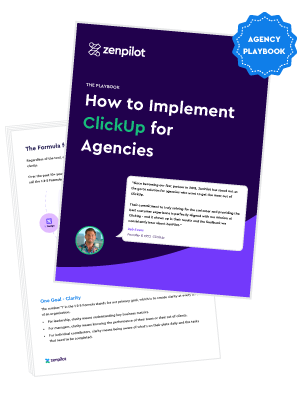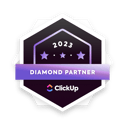How to Grow a Full-Service Agency by Working in Pods, Nurturing Talent, and Focusing on User Experience (feat. Jesse Resnick)

"Small groups of highly skilled, highly motivated, well communicating people can just achieve more than you can at a large organization."
Jesse Resnick, co-founder of Ei Digital, a full-service digital agency, was our recent guest on Agency Journey.
This episode is a must-listen for agency owners and managers looking to build a high-performing team culture.
Jesse talked about:
💡 His journey from working in larger agencies to establishing Ei Digital
💡 The journey of Ei Digital from a modest start to a full-service agency
💡 How Ei Digital's pod-based team structure enhances efficiency and client service
💡 Jesse's perspective on the intersection of brand and performance marketing in the digital age
💡 Strategies for nurturing and developing talent within a digital agency
💡 Utilizing strategic vision to maintain a high-quality user experience while scaling
💡 The importance of EBITDA and other financial metrics in agency decision-making
Resources Mentioned:
📚 Principles by Ray Dalio: Jesse's recommended reading for agency principles
📚 NPR: Jesse's source of inspiring financial stories
📚 Accrual Accounting: Jesse highlighted how it transformed his agency operations
You can also scroll below for a collection of Jesse's interesting insights from the show!
On the Philosophy of Building a Full-Service Agency
Jesse emphasized that Ei is a full-service agency, and he explained how he arrived at this approach—almost as a reaction against his previous experiences.
"The foundation of our philosophy has always been strategy and great user experience.
And we use user experience pretty broadly.
Before starting this, I was a creative director at LBi, which became DigitasLBi.
And the thing that always frustrated me the most was that I'd be in strategic conversations, I'd be leading business development or idea creation for something.
But really, the model often at a bigger agency is then the work gets passed down the chain to be executed.
And I really care about the ideas, and I care equally about the execution.
So for us, it was pulling everything through the line.
So the question: were we full service from the beginning?
The vision was always full service."
You know this as a leader: the quality of the execution is just as important as the quality of the idea, if not more. Jesse is another one of our guests who emphasized this.
On the Future of Brand Marketing
It was interesting hearing Jesse's insights on brand vs performance marketing, and how the two may end up coming together in the near future.
"If I look at the marketing landscape right now, you know, if you were to kind of draw two macro circles, you would look at it through a brand and a performance lens, right?
And generally, marketers are looking at their marketing spend, looking at their P&L, looking at their activities through one of those two lenses.
And they're very different.
Brand is all about the emotional connection. It's a long term strategy.
And performance is all about conversion now, selling more.
And both are really valuable.
And in a lot of ways, I would think of the brand side more in an advertising classic sense and the performance side more in the marketing, digital marketing sense.
Again, depending on who you're talking to, you know, terms can be different things.
These two things are meeting in the middle, as far as I'm concerned, because the shifts in privacy, shifts in cookies, you're seeing brand marketers understand that they can start to bring more data into their brand marketing to understand performance of brand.
And I think the performance people are starting to understand, well, short-term performance-based work can only take you so far.
There's the, I think it was a New York Times or Wall Street Journal article on Airbnb from a couple of years ago, where Airbnb was like, we don't do performance, we're 100% brand.
That sent some shockwaves through my world of people going, yeah, wait, is it performance or is it brand?
And I thought that was actually an awesome discussion that really kicked off, because it's not one or the other.
And it's definitely contextual on the specific client.
But that intersection of brand and performance that exists now is, for me, the future of brand marketing."
Tips On Working in Pods and Agency Operations
A part of the conversation that stood out was Jesse's experience with structuring Ei Digital as a pod-based agency.
Here are his insights about it:
"Our account teams are essentially set up as little working groups or pods.
We even color code them. So that's the green team, the blue team, etc.
And then we have departments of resources, whether it's creative, technology folks or digital marketing—deep T skill sets.
And those account teams work closely with those.
And we look at our client work and we mirror what the client needs versus mirroring our own structure.
It scales pretty well, actually, because we keep that small structure.
And it just requires a kind of consistency to be kept amongst those smaller groups."
At that point Gray, who was interviewing Jesse, got curious about the operational details of working in pods.
He asked:
"So the first operational question is, how are you assigning new clients to specific pods? Sometimes that's by specialization, sometimes just capacity, but what does that look like for you?"
Jesse's response shed a lot of light on how to make pods work for an agency:
"So it's changed over the years, and we've approached it differently at different times.
Right now, we have basically one pod that is always set up to intake new business.
And so they're at, let's say, 60% capacity as a unit.
And so what's always been difficult is if you run everybody at 100% or 90% capacity, you're basically just needing to hire into every piece of new work you get
Which when you're very small works fine, and we would stay very close to that business.
But right now, what we do is we keep one pod effectively lower in capacity.
They partner with our business development team and myself in winning new business, and then it creates a really smooth onboarding for that client.
There are instances, like you say, if we're working with a super specialized client, let's say as a Pharma side client or with medical aesthetics, something like that, we will sometimes hire in a specialist to work on that, to be attached to that work.
But most of the time, it goes into the pod that has intentional capacity."
This is the stuff that I love about Agency Journey: practical tips for people who have found methods that work.
Tips On Financial Management and Profitability
Jesse also went deep into the financial aspects of running an agency, prompted by this question from Gray:
"What are the three to five main metrics you look at in your business every week?"
His response was an education in accrual accounting, among others:
"It's amazing to me how many agency owners I meet who run their books on a cash basis.
And I have helped many understand accrual accounting and shift their whole mindset.
But, you know, macro accrual accounting is invaluable if you're trying to run a strong P&L and really understand it.
For anybody who [doesn't know it], accrual accounting is taking in the dollars as you earn them, not as they're deposited into your account, right?
So I'm hired to do a brand strategy. I'm hired for a website. I'm on a retainer.
Every month I get that retainer, or each bit of work I complete—I recognize my revenue against when I'm doing the work versus when the check is deposited.
And matching that up with your, we're mostly based on W2 full-time employees.
We don't use a huge amount of freelancers, which is different than probably a lot of shops our size.
But we're matching up utilization against those numbers.
And we break [down], we essentially run each pod as a mini P&L, and then we roll everything up.
I actually have my account directors do their own revenue allocations.
So they're in charge of: 'Great, I work with Bushmills, I worked with Allergan, I did this amount of work. This is the amount of revenue I'm recognizing.'
And I've always played a game with myself. This is how I'm built:
Even when it was just me and Walter, I think about departments and I think about reporting to a board.
So I'm the founder and CEO here. I don't have a board.
I still act as if I do.
So I'm always telling financial stories. I'm always prepared to explain the numbers.
I'm trying to balance my months and my quarters.
And if they don't match, it bugs the shit out of me. And I work to kind of balance that story.
So, long-winded answer, but the metrics I look at are macro metrics of month-over-month P&L metrics.
Gross revenue, net revenue, super important to distinguish between the two.
Our operating stays pretty flat. Our salaries stay pretty flat.
And then we measure everything against EBITDA.
So everything is: what is the EBITDA of it at the end of the day?
I would turn down a million-dollar project—unless there was some strategic reason to take it—but I'll turn down a million-dollar project that costs us a million dollars to do any day of the week.
Not everybody would do that. And sometimes there is an advantage to taking that on.
But I'm a pretty old-school business guy looking to run a sustainable and sound business.
We play our numbers pretty conservative.
And that comes out of my pocket, right?
We also pay ourselves last, always."
Tips on Personal Growth and Business Leadership
When asked about his #1 tip for agency operators, Jesse couldn't stop at just one:
"Disarticulate your identity from the work.
That is a hard one for a lot of entrepreneurs and a lot of people in general.
But I think it's really, really important to do.
And if I can give a second one, especially if you're earlier in your professional career, would be to not pull out as much money as you can, but also to make sure you're earning money.
I've seen people go one of two ways.
You have the person who's like, oh, shit, I made some money. I'm going to Vegas!
I literally know that guy.
And on the other side, I've seen people just work their faces off and not earn money.
Make sure you know why you're doing it.
It's not all about the money and it shouldn't be.
But if you're running a for-profit enterprise, make sure you're getting paid along the way."
On point. 'Nuff said.
There's More You Can Do to Help Your Agency Grow
As with every episode of Agency Journey, the conversation with Jesse highlights the importance of closely examining the way your agency runs to create a business that delights clients and delivers a healthy bottom line.
Here at ZenPilot, we've identified the 3 keys to gold-standard operations:
- Processes
- Tools
- Habits
And you really need to take care of all three to unlock growth for your agency—and let yourself take a step back and reap the rewards.
If you want an agency that's not only growing, but becoming more resilient and independent at time goes on...
...you need a solid system for all of your agency operations.
We recommend building a system like that on top of ClickUp, which we've found to be the most flexible, full-featured tool for running an agency.
(How do we know? We've tested nearly every PM tool on the market and delivered successful ops consulting for nearly 2,700+ agencies.)
But ClickUp's flexibility can lead to some botched implementations that only create confusion and slow you down.
So grab ZenPilot's Guide to ClickUp for Agencies to discover the best way to get the most out of ClickUp and avoid the pitfalls.
If you do ClickUp right, you'll be able to not only see all ongoing and upcoming work in a logical system...
...you'll also be able to pull utilization and profitability data and build a full dashboard of where your agency is making (or losing!) the most money.
And don't forget to subscribe to Agency Journey for more insightful episodes.
See you around!




